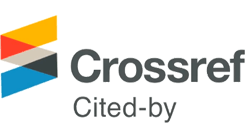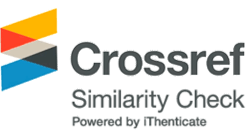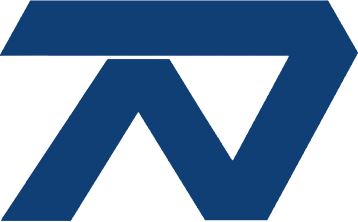Editorial Policies
Ethics Regulations of Publication of Academic
Journals of Computational Structural Engineering Institute of Korea
Enacted on 21 January 2008
Amended on 12 March 2020
PREAMBLE
The Computational Structural Engineering Institute of Korea (COSEIK) is an academic body(institution) to help advance science and technology by contributing to the development and distribution of the studies and technologies of structural engineering using the electronic data processing. The COSEIK is making a huge contribution to providing the latest technical information and data on computational structural engineering by publicizing academic journals and equivalent publications.
The ethics regulations on publication of academic journals (hereinafter referred to as ‘ethics regulations’) give fairness and responsibility to the members of the COSEIK (hereinafter referred to as ‘members’) during the process of research paper submission to publication and deal with the principles and standards that should to be complied in each process.
The members shall recognize and share the research values by complying with the ethics regulations in conducting the academic researches and publishing the research papers, and be committed to developing the selected and published papers through the fair and strict examination to be published in the professional academic journal. The regulations have significance to lay a foundation to increase and encourage the ethics level of the members’ research activities.
Chapter 1 Ethics Regulations on Research
Article 1 Ethics Regulations on Authors
1. Authorship
Authorship credit should be based on 1) substantial contributions to conception and design, acquisition of data, or analysis and interpretation of data; 2) drafting the article or revising it critically for important intellectual content; 3) final approval of the version to be published; and 4) agreement to be accountable for all aspects of the work in ensuring that questions related to the accuracy or integrity of any part of the work are appropriately investigated and resolved. Each author should meet these four conditions.
Journal of Computational Structural Engineering Institute of Korea does not permit the changing/adding/deleting of authors after submission of the paper. Only in rare cases, such as the work substantially changing in response to reviewer comments, should addition or removal of an author be considered after submission.
2. Citations and Reference Description
2.1 If the public academic data is cited, the members shall make efforts to accurately describe it and clearly reveal the source unless the data does not belong to the general knowledge. If the data is obtained from the examination of research papers or proposals or personal contacts, the data can be cited upon the approval of the researcher who offered the information.
2.2 If other’s writings are cited or ideas are borrowed (referred), the members shall reveal the citation and reference with footnotes, and separately specify the results of advanced researches and their own ideas, arguments and interpretations so that the readers can distinguish between them.
3. Publication Achievements
3.1 The responsibilities and achievements of the authors shall be recognized only on the research conducted or published by the authors.
3.2 The order of the names of the authors (translators) of research papers or publications shall be reflected clearly depending on the extent of contribution to the research, regardless of their relevant positions. It may not be legitimate to become an author or be recognized as the lead author just because the person is on a certain position. On the other hand, it may not also be legitimate not to record the name of a person as a co-author (translator) or co-researcher although the person contributed to the research or writing (translation). Therefore such contributions shall be properly appreciated in the acknowledgements.
4. Correction of Research Papers
The authors shall make efforts to accept the opinions which are suggested by the editors and examiners during the paper examination process as much as possible and reflect them to their research papers. If they do not agree with the opinions, they shall notify the editing committee of the specific grounds and reasons in writing.
5. Prohibition of Plagiarism
The authors shall not suggest the research results or arguments that they have not conducted in research papers or publications as if the research results or arguments are theirs. It is possible to refer to others’ research results many times by specifying the sources but such a behavior to suggest parts of others’ achievements as their own research results or arguments shall be regarded as plagiarism.
6. Prohibition of Duplicate Publication or Double Publication
The authors shall not submit or publish their previously published papers (including the ones that will be published or are under examination) in domestic and international journals as if they are newly created papers. If the authors want to publish the previously published papers, they shall offer the publication information to the editor of the academic journal and verify whether they are subject to duplicate or double publications.
Article 2 Ethics Regulations for Editors
1. The editors shall examine the research papers submitted to publicize in the academic journal in a fair and strict manner based on the quality of the papers and the submission regulations, regardless of name, age and organization of the authors, as well as prejudice or closeness.
2. The editors shall request examination of the submitted papers to the examiners who have professional knowledge and fair decision-making ability, and try to make examination objective by avoiding the examiners who are too close or hostile to the editors. However, if the examination results on the same paper are significantly different among the examiners, the editors may request the third examiner for examination.
3. The editors shall not disclose the matters on the authors or the content of the papers to others except for the examiners until the confirmation of the publication of the submitted papers.
Article 3 Ethics Regulations for Examiners
1. The examiners shall sincerely examine the requested papers by the editing committee (editors) of the academic journal within the set period by the examination regulations and notify the results to the editing committee (editors). If the examiners are not appropriate to examine the papers, they shall notify the fact to the editing committee (editors).
2. The examiners shall fairly examine the research papers under the objective standards rather than their personal academic belief or friendship with the authors. The examiners shall not disapprove the publication of the papers without specifying enough reasons and not disapprove if the points of view or interpretations of the examiners are conflicted with the papers. In addition, the examiners shall not examine the papers without thoroughly and intensively reading them.
3. The examiners shall respect the character and independence of the authors as a professional scholar. The examiners shall reveal their decisions on the papers in the paper examination report and specifically specify the reasons if the papers need to be supplemented. The examiners shall use polite and soft expressions as much as possible and avoid using any degrading and insulting expressions to the authors.
4. The examiners shall keep the confidentiality of the examined papers. If they ask for advices for examination, they shall not show the papers to others nor discuss with others over the content of the papers. In addition, the examiners shall not cite the papers without approval from the authors before the academic journal containing the papers is published.
Chapter 2 Enforcement Guidance on Ethics Regulations
Article 1 Pledge of Ethics Regulations
The members of the COSEIK shall pledge to comply with the ethics regulations.
Article 2 Report on Violation against Ethics Regulations
The members shall make efforts to correct the problems when recognizing other members’ violation against the ethics regulations by reminding the violating member of the ethics regulations.
Article 3 Organization of Ethics Committee
The ethics committee shall be under the editing committee, composed of over 6 editors who are appointed by the chairman upon the recommendations from the editing committee. The chairman of the ethics committee shall be decided by vote.
Article 4 Authority of Ethics Committee
The ethics committee may conduct a comprehensive investigation on the reported violation against the ethics regulations through informants, examinees, witnesses, testifiers and evidential materials, and propose proper disciplinary actions to the chairman if the violation is determined to be true.
Article 5 Investigation and Deliberation
Any reported members for violating the ethics regulations shall cooperate with the investigation by the ethics committee. Refusal to cooperate with the investigation itself shall be regarded as a violation against the ethic regulations.
Article 6 Guarantee of Explanatory Opportunity
Any reported members for violating the ethics regulations shall be given enough opportunities to explain their position.
Article 7 Confidentiality of Investigation Subjects
The ethics committee members shall not disclose the identity of the member in question to outside until the final disciplinary action is determined by the COSEIK on the violation against the ethics regulations.
Article 8 Procedure and Content of Disciplinary
Action When the ethics committee proposes disciplinary actions, the chairman shall make a final decision on whether taking the disciplinary action and the details of the disciplinary action after calling up the board of directors. The member who has been determined to violate the ethics regulations may receive disciplinary actions including warning, suspension of membership or deprivation of membership, and such actions may be informed to other organizations or individuals.
Article 9 Correction of Ethics Regulations
The correction procedure of the ethics regulations shall comply with the revision procedure of the COSEIK. If the ethics regulations are corrected, it shall be regarded that the members who pledged to comply with the existing regulations shall comply with the new regulations without pledging.
Process for Identification of and Dealing with Allegations of Research Misconduct
When the journal faces suspected cases of research and publication misconduct such as redundant (duplicate) publication, plagiarism, fraudulent or fabricated data, changes in authorship, an undisclosed conflict of interest, ethical problems with a submitted manuscript, a reviewer who has appropriated an author’s idea or data, complaints against editors, and so on, the resolution process will follow the flowchart provided by the Committee on Publication Ethics (COPE) according to COPE’s guideline (http://publicationethics.org/resources/flowcharts). The discussion and decision on the suspected cases are carried out by the Editorial Board. The journal adheres to the ethical guidelines for research and publication described in Guidelines on Good Publication (http://publicationethics.org/resources/guidelines) and the JCOSEIK Guidelines (https://www.jcoseik.or.kr).
Authorship and Contributorship
Authorship credit should be based on 1) substantial contributions to conception and design, acquisition of data, and/or analysis and interpretation of data; 2) drafting the article or revising it critically for important intellectual content; 3) final approval of the version to be published; and 4) agreement to be accountable for all aspects of the work in ensuring that questions related to the accuracy or integrity of any part of the work are appropriately investigated and resolved. Each author should meet these four conditions.
Journal of the Computational Structural Engineering Institute of Korea (hereinafter referred to as ‘JCOSEIK’) does not permit the changing/adding/deleting of authors after submission of the paper. Only in rare cases, such as the work substantially changing in response to reviewer comments, should addition or removal of an author be considered after submission.
- Corresponding author and first author: the journal does not allow multiple corresponding authors for one article. Only one author should correspond with the editorial office and readers for one article. JCOSEIK does accept notice of equal contribution for the first author when the study was clearly performed by co-first authors.
- Correction of authorship after publication: JCOSEIK does not correct authorship after publication unless a mistake has been made by the editorial staff. Authorship may be changed before publication but after submission when an authorship correction is requested by all of the authors involved with the manuscript.
Complaints and Appeal
JCOSEIK deals with complaints and appeals in accordance with the recommendations of the COPE : https://publicationethics.org/appeals. Authors who wish to request reconsideration of a rejected manuscript can do so by emailing the journal’s Editorial Office (coseik@coseik.or.kr) including the manuscript ID number. Please note that reconsideration will be conducted only at the discretion of the Editor(s). Please be advised that, due to keen competition for space in our journals, manuscripts may be considered low priority and subsequently rejected. Authors should explain in detail the reasons why they believe their manuscript should be reconsidered. If it is determined that it should be reconsidered, then the author may be asked to submit it as a new manuscript. The manuscript will then receive a new identification number and submission date and undergo review as a new submission.
Conflict of Interest
The corresponding author must inform the editor of any potential conflicts of interest that could influence the authors’ interpretation of the data. Examples of potential conflicts of interest are financial support from or connections to companies, political pressure from interest groups, and academically related issues. In particular, all sources of funding applicable to the study should be explicitly stated.
Data sharing and Reproducibility
Authors are encouraged to make all data that is generated by their research, and that is drawn upon in their article, available at the earliest opportunity, wherever legally and ethically possible.
Ethical Oversight
JCOSEIK follows the COPE definition of ethical oversight; ethical oversight should include, but is not limited to, policies on consent to publication, publication on vulnerable populations, ethical conduct of research using animals, ethical conduct of research using human subjects, handling confidential data and ethical business/marketing practices.
Intellectual Property
JCOSEIK recognizes the importance of intellectual property rights in research and publication. This Intellectual Property Policy outlines the principles and guidelines regarding the protection and use of intellectual property in articles published in JCOSEIK. Authors are responsible for ensuring that their research and manuscript comply with intellectual property laws and regulations. Any concerns or disputes related to intellectual property should be reported to the JCOSEIK editorial office for appropriate action.
Copyright Policy
All published papers will become the permanent property of Computational Structural Engineering Institute of Korea and must not be published elsewhere without written permission from the Society. A copyright transfer agreement form should be submitted electronically on the submission website. This form can be downloaded at the paper submission system: (https://jcoseik.or.kr,
https://submission.jcoseik.or.kr/media/editor/uploads/2021/07/19/copyright-transfer-agreement_2020.hwp or https://submission.jcoseik.or.kr/media/editor/uploads/2021/07/19/copyright-transfer-agreement_2020.docx )
Licensing Information (Policy)
JCOSEIK is an open access journal distributed under the terms of the Creative Commons Attribution Non-commercial license, which permits unrestricted use, distribution, and reproduction in any medium, provided the original work is properly cited for non-commercial purposes.
Creativity Commons
JCOSEIK is distributed under the terms of the Creative Commons Attribution License
(https://creativecommons.org/licenses/by-nc/4.0/), which permits unrestricted, distribution, and reproduction in any medium, provided the original work is properly cited.
Policies on posting accepted articles with third parties (Deposit Policy)
According to the deposit (self-archiving) policy of Sherpa/Romeo (http://www.sherpa.ac.uk/), authors cannot archive a pre-print, but they can archive a post-print (i.e. final draft after publication). Authors can archive the publisher's version/PDF.
The unique doi or Digital Object Identifier is assigned to all paper published in JCOSEIK.
Archiving
If the journal is no longer published, it is accessible without barriers from the COSEIK website, the Korea Citation Index (https://www.kci.go.kr), or the National Library of Korea (http://nl.go.kr).
Revenue Sources
The journal's revenue sources included support from the publisher (Computational Structural Engineering Institute of Korea) and funding from the Korean government.
Direct Marketing
Full-text PDF files are also available on the official website (https://www.jcoseik.or.kr/). To order a subscription to the Journal of the Computational Structural Engineering Institute of Korea, please contact our editorial office. Computational Structural Engineering Institute of Korea provides the journal to member institutions for free and to individual members for an annual subscription fee of 20,000 Korean Won.

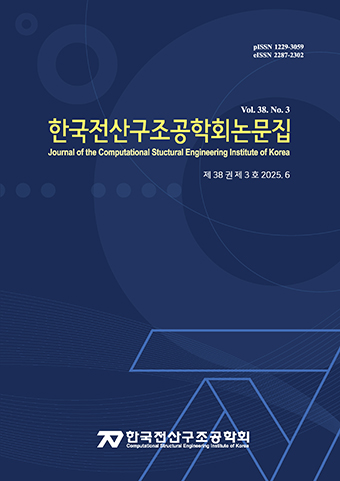 Journal of the Computational Structural Engineering Institute of Korea
Journal of the Computational Structural Engineering Institute of Korea



